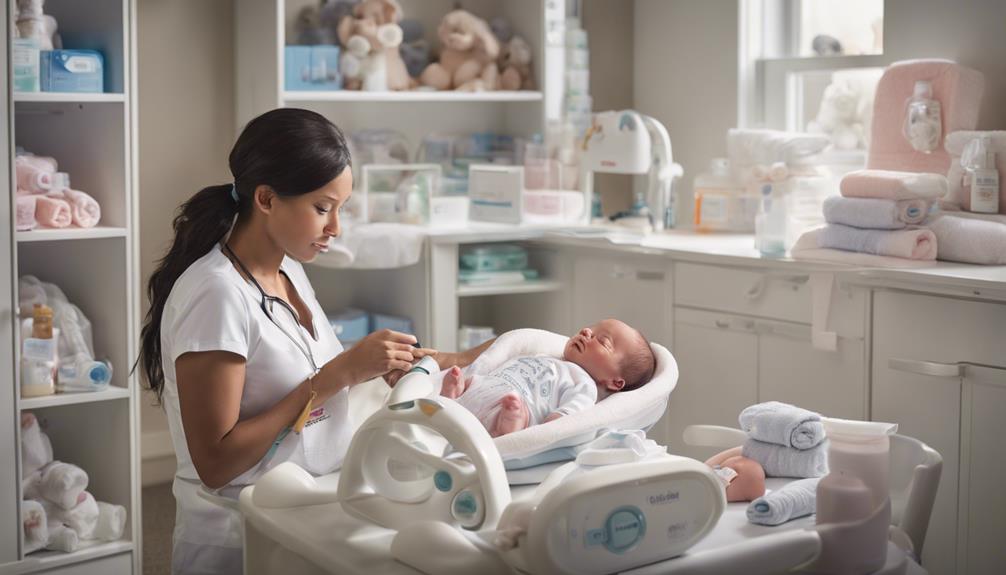As we progress through the intricate journey of becoming a Newborn Care Specialist, we compare ourselves to skilled gardeners, nurturing our knowledge and abilities until they blossom, shaping us into authorities in this specialized field.
Every step taken in this journey requires careful planning and dedication, much like tending to delicate blossoms. The initial stages may seem challenging, but as we uncover the secrets of this profession, a world of opportunities awaits.
Join us as we explore the essential steps to cultivating a rewarding career as a Newborn Care Specialist, where each phase brings us closer to the fulfillment of our passion for newborn care.
Key Takeaways
- Pursue formal training and certifications in newborn care essentials.
- Gain hands-on experience to build expertise and credibility.
- Invest in specialized NCS training for career advancement.
- Utilize resources like NCS Association for guidance and support.
Understanding the Role of a Newborn Care Specialist
As newborn care specialists, we play a pivotal role in providing essential support to families as they navigate the journey into parenthood. Our specialized training equips us with the skills needed to offer overnight care, feeding support, and expert guidance in newborn care. With experience working closely with newborns, we bring a wealth of knowledge to assist parents in understanding their baby's needs.
One essential aspect of our role is ensuring the safety of the newborn. This is why NCS certification and CPR training, including infant/child CPR, are essential components of our training. We're ready to handle any situation that may arise with confidence and skill, giving parents peace of mind knowing their little one is in capable hands.
Our dedication to providing thorough care extends beyond basic tasks. We help establish routines, offer sleep training support, and troubleshoot any issues that may arise. By offering our expertise and compassionate care, we aim to make the shift into parenthood as smooth as possible for families.
Meeting the Necessary Qualifications

To become a qualified newborn care specialist, one must diligently pursue formal training, gain practical experience, and obtain essential certifications in newborn care practices.
Formal training is important, encompassing courses on feeding, sleep training, and general baby care. It's equally significant to gain hands-on experience working with newborns and families to develop the necessary skills and knowledge.
Acquiring certifications in areas such as infant/child CPR, first aid, lactation consulting, and sleep training is necessary to demonstrate expertise and dedication to the field. Consider enrolling in specialized training programs accredited by recognized organizations to enhance credibility.
Adhering to industry standards and requirements is crucial to establish trust and credibility with families seeking newborn care specialists. By meeting these qualifications, you not only enhance your professional growth but also provide a higher level of care and support to newborns and their families.
Pursuing Specialized Training and Certifications
After meeting the necessary qualifications, the next step involves actively pursuing specialized training and certifications to further enhance our expertise as newborn care specialists. Investing in newborn care specialist training, certifications like NCS certification, and specialized courses in infant/child CPR and first aid is important. Ensuring that all certifications come from accredited organizations to maintain credibility.
By obtaining these certifications and engaging in specialized training, we not only improve our professional skills but also make our profiles more appealing to families. Families often prioritize specialists with higher levels of training and education, which can lead to commanding higher rates for our services.
Specialized training plays a crucial role in enhancing our knowledge and skills in newborn care, ultimately setting us apart as professionals in the field. It's a valuable investment that demonstrates our commitment to providing excellent care for infants and newborns.
Building Your Newborn Care Specialist Career

Beginning on a journey to construct a successful career as a Newborn Care Specialist involves gaining valuable experience working directly with infants and families. Here are essential steps to help you build your career in newborn care:
- Acquire Hands-On Experience: Start by working closely with infants and families to understand the nuances of newborn care.
- Move to NCS Roles: Progress from a caregiver to more specialized roles like overnight or full-day Newborn Care Specialist to enhance your skills.
- Pursue Certification and Training: Consider obtaining Newborn Care Specialist certification and enroll in additional training programs to improve your expertise.
- Utilize Resources: Make use of organizations like the Newborn Care Specialist Association for guidance on establishing yourself as a specialist in the field.
Tips for Success as a Newborn Care Specialist
For those aspiring to excel as Newborn Care Specialists, cultivating a strong foundation of practical experience and essential skills is paramount for success in the field. To thrive in newborn care, consider undergoing the Specialist Basic Skills Assessment offered by the Nanny Association Newborn Care. This assessment can pinpoint areas for improvement and guide your training efforts.
Enrolling in accredited training programs can equip you with the necessary skills and knowledge to excel in this role. Obtaining certifications in infant/child CPR, first aid, lactation consulting, and sleep training can enhance your qualifications and boost your credibility as a specialist.
To advance your career, stay connected with resources like the Newborn Care Specialist Association for valuable insights and support. It's important to stay updated on industry trends and continuously seek professional development opportunities to make sure you remain at the forefront of newborn care practices.
Frequently Asked Questions
What Are the 5 Initial Steps of Newborn Care?
We guarantee a safe sleeping space, focus on feeding (breast or bottle), change diapers for hygiene, monitor temperature, and dress the baby appropriately. Gentle interactions provide security and love, vital in the initial care routine.
What Does a Newborn Care Specialist Do?
We provide overnight care, feeding support, and general baby care to newborns, assisting parents with routines, sleep training, and troubleshooting. Our role includes bringing the baby to the mother for breastfeeding, organizing appointments, and ensuring well-being.
What Are the Levels of Newborn Care?
In newborn care, we navigate three levels: basic care for daily needs, advanced care like sleep training and routines, and specialized care for unique situations. Each level demands distinct skills to provide families and newborns top-notch support.
What Is the Newborn Care Process?
In our experience, the newborn care process involves providing overnight care, feeding support, and assisting parents with general baby care tasks. We help establish routines, aid in sleep training, and offer guidance on newborn activities to guarantee well-being and development.
Conclusion
To start, becoming a Newborn Care Specialist involves gaining experience, pursuing training, and continuously learning to excel in the role.
Did you know that according to the Newborn Care Specialist Association, the demand for NCS professionals has been steadily increasing by 10% each year?
By following the steps outlined in this guide, you can start on a rewarding career helping families navigate the early stages of parenthood with confidence and expertise.









